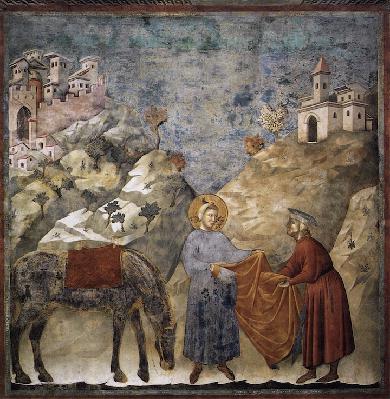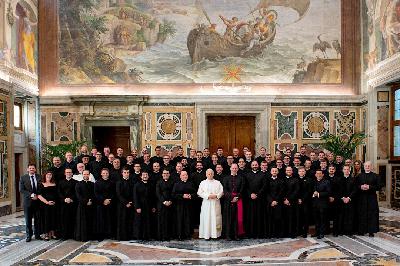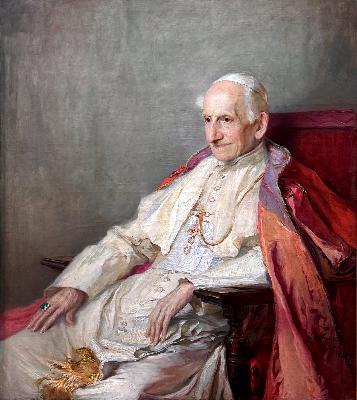The Two Forms of Christian Service
Update: 2025-10-15
Description
By David G Bonagura, Jr.
Christianity is a religion of paradoxes. One is the strange relationship between the natural world that we see and the supernatural world that we do not. The latter is where God resides and is our ultimate home. At the same time, it is ever-present to us: it sustains and penetrates the natural order while enveloping us in multiple ways.
God is present in us through sacramental grace and before us in the Eucharist. He is also present in a different way in other people whom we encounter, an astonishing fact Jesus taught plainly: charitable acts transcend both worlds. "Truly, I say to you, as you did it to one of the least of these my brethren, you did it to me." (Matthew 25:41 )
Serving others is as essential to Christian practice as Sunday worship, prayer, and keeping the commandments, and ways to serve are abundant. Rightfully, Catholic schools and religious education programs compel their students to perform charitable works in the hope that they will learn to cultivate a habit of serving.
In Book X of The City of God, St. Augustine reminds us of another form of service. "If a man loves himself, his one wish is to achieve blessedness, which is to be near God. Thus, if a man knows how to love himself, the commandment to love his neighbor bids him to do all he can to bring his neighbor to love God. This is the worship of God; this is true religion; this is the right kind of devotion; this is the service which is owed to God alone."
If the greatest act of charity is to give God to another person, why don't we regularly encourage this form of giving? Perhaps because it is easier to give money or material things. Perhaps because our view of service suffers from a false dichotomy imagined between worship and charity. Perhaps because deep down we don't believe that God is the ultimate good for our lives.
This is not to say that we should cease material giving, which is necessary for all Catholics. Charity, like all things, is best understood in context. Catholic material charity in any form is not designed to be given alone; it is given along with the Gospel.
Franciscans, for example, do not give food to the poor and then send them away. They sit with recipients and befriend them with the intention of inviting them to know God. Material charity serves as the channel to God, who is charity - that is, love itself.
Hence, as an aside, attacks by states and the federal government against the Little Sisters of the Poor and other Catholic charity groups, on the grounds that the organizations perform social work, not religious work, strike at the essence of Catholicism itself. These government orders, therefore, are unlawful intrusions into the free exercise of religion.
Closer to home, how can we give the supreme gift of charity - God - to others, short of teaching the faith directly?
First, and perhaps greatest of all, we can bring someone to Mass who would not or could not go otherwise. This someone could be a fallen-away Catholic or an elderly person who needs help getting to church. The fallen away person requires courage to issue the invitation; the elderly person requires a significant sacrifice of time to get the person in and out of our car and then the church. "You received without pay, give without pay." (Matthew 10:8)
Second, we can bring to Mass those who can no longer get there. That is, we can have a Mass offered for the repose of a deceased loved one or friend. Better still would be to attend this Mass and offer our prayers for the deceased, as the one sacrifice of Christ is offered on the altar. In fact, I would recommend this practice for all candidates seeking Confirmation: arrange for two Masses for deceased loved ones, pay the offering from your own pocket, and then attend each Mass. In this act, you anticipate the grace you will receive at Confirmation: the strength to bear witness to the faith and bring it to others.
Third, and not far from the first two, we can invite - or prod, as the ca...
Christianity is a religion of paradoxes. One is the strange relationship between the natural world that we see and the supernatural world that we do not. The latter is where God resides and is our ultimate home. At the same time, it is ever-present to us: it sustains and penetrates the natural order while enveloping us in multiple ways.
God is present in us through sacramental grace and before us in the Eucharist. He is also present in a different way in other people whom we encounter, an astonishing fact Jesus taught plainly: charitable acts transcend both worlds. "Truly, I say to you, as you did it to one of the least of these my brethren, you did it to me." (Matthew 25:41 )
Serving others is as essential to Christian practice as Sunday worship, prayer, and keeping the commandments, and ways to serve are abundant. Rightfully, Catholic schools and religious education programs compel their students to perform charitable works in the hope that they will learn to cultivate a habit of serving.
In Book X of The City of God, St. Augustine reminds us of another form of service. "If a man loves himself, his one wish is to achieve blessedness, which is to be near God. Thus, if a man knows how to love himself, the commandment to love his neighbor bids him to do all he can to bring his neighbor to love God. This is the worship of God; this is true religion; this is the right kind of devotion; this is the service which is owed to God alone."
If the greatest act of charity is to give God to another person, why don't we regularly encourage this form of giving? Perhaps because it is easier to give money or material things. Perhaps because our view of service suffers from a false dichotomy imagined between worship and charity. Perhaps because deep down we don't believe that God is the ultimate good for our lives.
This is not to say that we should cease material giving, which is necessary for all Catholics. Charity, like all things, is best understood in context. Catholic material charity in any form is not designed to be given alone; it is given along with the Gospel.
Franciscans, for example, do not give food to the poor and then send them away. They sit with recipients and befriend them with the intention of inviting them to know God. Material charity serves as the channel to God, who is charity - that is, love itself.
Hence, as an aside, attacks by states and the federal government against the Little Sisters of the Poor and other Catholic charity groups, on the grounds that the organizations perform social work, not religious work, strike at the essence of Catholicism itself. These government orders, therefore, are unlawful intrusions into the free exercise of religion.
Closer to home, how can we give the supreme gift of charity - God - to others, short of teaching the faith directly?
First, and perhaps greatest of all, we can bring someone to Mass who would not or could not go otherwise. This someone could be a fallen-away Catholic or an elderly person who needs help getting to church. The fallen away person requires courage to issue the invitation; the elderly person requires a significant sacrifice of time to get the person in and out of our car and then the church. "You received without pay, give without pay." (Matthew 10:8)
Second, we can bring to Mass those who can no longer get there. That is, we can have a Mass offered for the repose of a deceased loved one or friend. Better still would be to attend this Mass and offer our prayers for the deceased, as the one sacrifice of Christ is offered on the altar. In fact, I would recommend this practice for all candidates seeking Confirmation: arrange for two Masses for deceased loved ones, pay the offering from your own pocket, and then attend each Mass. In this act, you anticipate the grace you will receive at Confirmation: the strength to bear witness to the faith and bring it to others.
Third, and not far from the first two, we can invite - or prod, as the ca...
Comments
In Channel
























